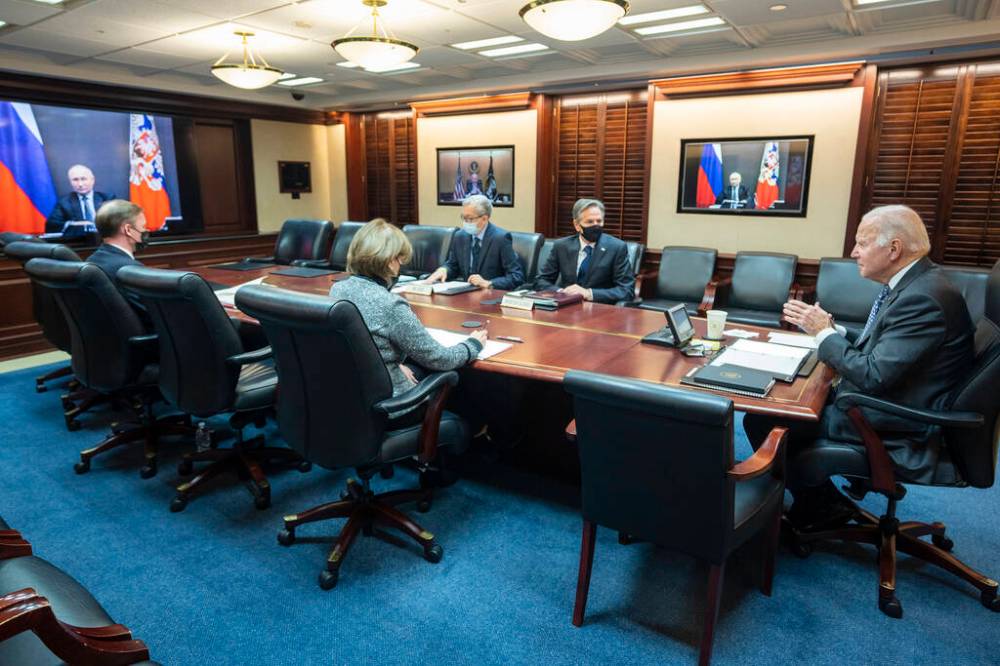Power and politics
Woodward chronicles Biden’s handling of global conflicts in fly-on-the-wall account
Advertisement
Read this article for free:
or
Already have an account? Log in here »
To continue reading, please subscribe:
Monthly Digital Subscription
$0 for the first 4 weeks*
- Enjoy unlimited reading on winnipegfreepress.com
- Read the E-Edition, our digital replica newspaper
- Access News Break, our award-winning app
- Play interactive puzzles
*No charge for 4 weeks then price increases to the regular rate of $19.00 plus GST every four weeks. Offer available to new and qualified returning subscribers only. Cancel any time.
Monthly Digital Subscription
$4.75/week*
- Enjoy unlimited reading on winnipegfreepress.com
- Read the E-Edition, our digital replica newspaper
- Access News Break, our award-winning app
- Play interactive puzzles
*Billed as $19 plus GST every four weeks. Cancel any time.
To continue reading, please subscribe:
Add Free Press access to your Brandon Sun subscription for only an additional
$1 for the first 4 weeks*
*Your next subscription payment will increase by $1.00 and you will be charged $16.99 plus GST for four weeks. After four weeks, your payment will increase to $23.99 plus GST every four weeks.
Read unlimited articles for free today:
or
Already have an account? Log in here »
Hey there, time traveller!
This article was published 16/11/2024 (349 days ago), so information in it may no longer be current.
Bob Woodward shot to fame 50 years ago when he and Carl Bernstein wrote the exposé All the President’s Men, implicating President Richard Nixon in the Watergate burglary. Since then, he has written 22 best-selling books on American governance, including three on Donald Trump. The totality of his work provides a valuable overview of the corruption of power within the American ruling class, but his approach is not without its controversies.
These arise out of his technique of “deep background,” in which he interviews major players on condition of guaranteed anonymity and usually takes them at their word (more about this below). This results in books that give a fly-on-the-wall perspective, giving us fast-moving chapters often full of apparently verbatim conversations.
Woodward’s latest book is not about Trump, although he does make a few appearances — rather, War is about President Joe Biden. Woodward describes how Biden and his team tried to manage the Russia-Ukraine and Israel-Gaza wars as well as the American withdrawal from Afghanistan, concluding that Biden and his closest advisors are decent people making good-faith efforts to wield presidential power responsibly in the national interest.

Adam Schultz / The White House
In this 2021 photo, U.S. President Joe Biden (right) speaks with Russian President Vladimir Putin by video conference.
Ironically, Biden’s problem-solving approach became his handicap. His 52 years as a legislator in Washington has given him unique insight into foreign affairs and a strong belief that no matter how dangerous an opponent might be, there is always a way to make a deal — especially in the age of nuclear weapons, when an existential threat hangs over both sides. For Russian President Vladimir Putin and Israeli Prime Minister Benjamin Netanyahu, Biden believed he could influence them once he figured out what their “off-ramps” might be. What he did not realize was that, unlike the Cold Warriors of the past, Putin and Netanyahu had no time for “off-ramps.” Putin had declared Ukraine an integral part of Russia, and there was no voluntary backing down from that.
Before the Oct. 7, 2023 massacre of over 1,200 Israelis by Hamas, Netanyahu’s leadership had been in tatters; he was facing criminal charges as well as widespread demonstrations against his proposed judicial reforms.
After October 7, Netenyahu succeeded in presenting himself as the kind of strong wartime leader that Israelis could rally around. Relentlessly, he declared he would not stop the war until he had killed every last member of Hamas, and scorned Biden’s calls for moderation.
Woodward’s most chilling revelation suggests that Putin was on the brink of unleashing tactical nuclear weapons during the battle for Kherson, Ukraine in the fall of 2022. The Ukrainian army had launched an overwhelming attack on the Russian garrison there; the Russian policy that justified the use of nuclear weapons to prevent a catastrophic battlefield loss was well-known.
Biden’s response was to call Putin and warn him of “catastrophic consequences” if he resorted to nuclear weapons. At the same time he had Secretary of Defense Lloyd Austin open a dialogue with his Russian counterpart. Most importantly, Biden convinced President Xi of China, Russia’s most significant supporter, to warn Putin to back down. Biden’s careful, multi-pronged approach worked.

War
Astonishingly, Woodward quotes Biden saying privately, “I’m not going to have a nuclear response to battlefield use in Ukraine.” This tribute to Biden’s humanity must surely have been music to Putin’s ears.
A major problem with Woodward’s unquestioning acceptance of his sources’ credibility crops up early in the book. Secretary of State Anthony Blinken was in Germany objecting to the European demand that Biden should send F-16 fighter planes to Ukraine. He dialled into a top-secret call with Biden, Austin, National Security Advisor Jake Sullivan and General Mark Milley. For more than two pages, Woodward quotes the “top secret” call word for word. If accurate, the source must have been one or more of the participants, which hardly speaks well of the integrity of Biden’s closest advisors.
However, it might explain why Woodward ends by praising Biden and his team as an example of steady and purposeful leadership.
Winnipegger John K. Collins thinks the poet Yeats predicted today’s world: “The best lack all conviction, while the worst are full of passionate intensity.”

